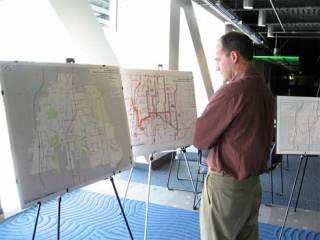More than 30 members of the business community and Kent city government were on hand May 21 at the ShoWare Center for a Kent Transportation Connection Roundtable, hosted by the Kent Chamber of Commerce.
Attendees listened to a presentation from the city and then weighed in on plans to start charging developers an additional fee as a way to pay for improvements to the city’s transportation system.
The impact fees would only be charged on new developments or change-of-use re-developments.
“If a lot of people move to Kent or a lot of new businesses move to Kent … that puts a lot of cars on our roads,” said Cathy Mooney, senior transportation planner and project manger for the city’s transportation master plan and impact fees.
The collected fees would go toward 43 projects in the city totaling $463 million. The fees would be levied based on the number of “p.m. peak” car trips that a project would generate. Residential units would be charged per unit and commercial and industrial developments would pay based on square footage.
As originally proposed, the impact fee would come to $13,537 per single-family home. A shopping center would be $21.79 per square foot and a supermarket comes to $63.33 per square foot while a fast-food restaurant would come to $130 per square foot.
The Kent City Council is currently considering the proposal and is expected to approve the impact fees in the city’s plan at a rate of between 50-67 percent of those listed in the city’s rate study.
For residential construction, that drops the cost to between $7,467 and $10,000 per unit, as well as cuts to the fee for all other developments.
A complete list of the proposed fees at their maximum cost is available on the city’s Web site.
Officials said most surrounding cities have instituted impact fees for transportation and said Kent’s proposed fees are in line with neighbors.
City Finance Consultant Randy Young also said that cities with impact fees are doing better in attracting development because it shows an investment in the future.
“What we’ve discovered is that development hasn’t stopped because of impact fees,” he said. “This is actually an investment in infrastructure that makes that land more useful to developers.”
Business leaders questioned the city’s presenters on the cost as well as the wisdom of implementing these fees in the current economic climate.
Garrett Huffman of the Master Builders Association said builders see this as an additional fee that would increase the cost to the homeowner and cited the economic situation.
“This makes it only that much more difficult,” he said.
Huffman also asked the city to consider placing the impact fees at the time a certificate of occupancy is granted, not during the permitting process because after the certificate of occupancy is where the impact really occurs.
According to Huffman, the concern for builders is in getting loans to finance their projects, especially in the current economy. By adding the impact fees in the beginning of the process, builders must get larger loans and the cost to buyers goes up even more because of interest on those loans.
Huffman said the industry understands the city’s needs for its transportation projects, but said “the timing couldn’t be worse due to the sluggish housing market” and said an increase in fees could mean a slower rebound and make it less likely that builders will bring new projects to the city.
Huffman also said that of 39 municipalities in the county, Kent’s proposed fees would put it among the most expensive eight.
Kent Chamber of Commerce membership director Dana Krawchuck said the chamber has not taken an official position on the impact fees and was currently going through its own internal process.
The city council is expected to further discuss the measure within the next two months. The Kent Reporter will provide the time and date of that meeting when it becomes available.
Talk to us
Please share your story tips by emailing editor@kentreporter.com.
To share your opinion for publication, submit a letter through our website https://www.kentreporter.com/submit-letter/. Include your name, address and daytime phone number. (We’ll only publish your name and hometown.) Please keep letters to 300 words or less.

